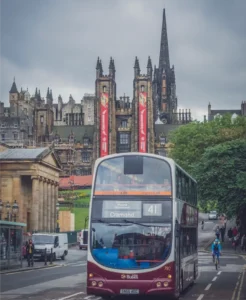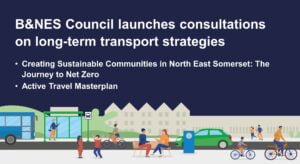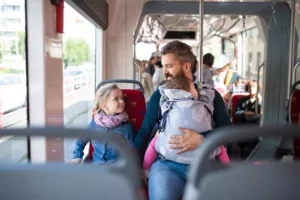An ambitious new project to decarbonise the UK’s transport infrastructure is beginning a consultation to help the nation achieve its net-zero commitments.
The Twinning for Decarbonising Project, or TransiT, has received the backing of the Engineering and Physical Sciences Research Council (EPSRC) to begin scoping the potential of digital capabilities and strategies to manage the reduction of carbon emissions from transport across the country.
TransiT was announced this week by Transport Technology and Decarbonisation Minister Jesse Norman at the inaugural Connected Digital Twins Summit by Connected Places Catapult, the UK’s innovation accelerator for cities, transport and place leadership, and the Digital Twin Hub.
Currently, around a third of the UK’s total carbon emissions come from transport, making it a key priority for rapid decarbonisation.
The TransiT award highlights how vital digital technology will be to help the UK to reach its decarbonisation targets. The initial funding of £500,000 will support an extensive consultation to explore the potential of digital technology to decarbonise, with the support of industry, policymakers and other stakeholders.
Once the first phase is successfully completed later this year, a second phase will aim to implement the outcomes of the consultation.
The project, which aims to find consensus about how digital technologies can accelerate the decarbonisation of transport, is being led by experts from Heriot-Watt University and the University of Glasgow.
Digital twins are sophisticated computer simulations of real-life physical objects, processes or systems which can help guide decisions about how their performance can be improved.
As sensor technology becomes cheaper and more ubiquitous, and computing power increases along with growing connectivity, digital twins are becoming more widely adopted to help shape the future of many industries, from healthcare to aerospace engineering.
While digital twins have been used in transport-related projects in the past, their application has been limited to smaller-scale challenges like the modelling of components in a single system.
The TransiT Hub team’s ultimate aim is to create a digital twin that encompasses the entirety of the UK transport infrastructure, providing a data-driven foundation for the urgent decarbonisation the country requires to reach net zero.
During the initial six-month consultation phase of the project, starting this month, the team will map the country’s current transport infrastructure with input from industry, policymakers and civil society across all four UK nations.
The results of the consultation will help to inform the research priorities, structure and membership of the proposed TransiT Hub in the second phase. The Hub’s members will work together to build an inclusive digital toolset which will transform transport services, networks, systems and assets in the years to come.
Professor Phil Greening of Heriot-Watt University said: “The UK has targeted a reduction in carbon of 78% by 2035. Transport accounts for approximately a third of our total emissions and the changes required will be transformative. We don’t have long to work out what we need to do, and digital twins, along with other digital approaches, offer the fastest route to de-risking investment and accelerating decarbonisation.
“Digital twins offer the possibility of much better transport user experiences. Citizens will work with academics and industry to co-create better transport solutions, and businesses will be able to use digital methods to develop risk free approaches to deploying radical green solutions. “
Professor David Flynn, at the University of Glasgow, explained: “In 2022, the UN Environment Programme (UNEP) was unequivocal: calling for radical transformation of the world’s energy sector. Energy production represents 71% of global greenhouse gas emissions, with demand for transport representing 15% of emissions. To date, the energy transition has predominately treated energy and transport networks separately. Such silo investments have failed to deliver the required rate of decarbonisation and would demand an investment of around £80-£150 trillion.
“Multi-vector – or whole-systems – thinking is viewed as a necessity to a timely, inclusive, affordable and sustainable energy transition. Through digital twinning technology, we can couple these previously distributed, complex and dynamic networks, assets and services, into a representative and real-time common virtual (digital) environment to explore how best to create solutions for the operational and planning challenges we face.
“Digital twins allow us to explore new relationships and partnerships, in near to real-time, to enable a responsible and effective transition in the decarbonisation of the UK’s road, rail, maritime and aviation systems, as well as incorporating new developments like autonomous vehicles.
“We’re keen to involve a broad range of stakeholders in our initial six-month consultation, including citizens, regulators, industry, commerce, government and green finance investors. It’s vital that we collaborate in new ways to deliver timely solutions to the climate crisis, which will also unlock new social and economic benefits. Time is short and we need to be able to model the solutions that will work in the real world for industry, people and the planet.”
Dr Kathryn Magnay, EPSRC’s Deputy Director for Cross-Council Programmes said: “These newly appointed research leaders will convene communities across digital twins, transport, energy and social science domains. They will bring together a multidisciplinary understanding of transport research challenges and identify future digital twinning activity in the sector. This important systems level work will take us one step closer to the creation of a digital twinning research hub which will support and accelerate the decarbonisation and integration of the UK’s transport systems.”





















